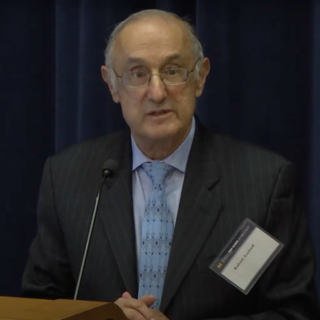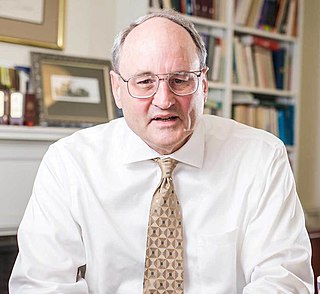External links
Recipients of the Karl Deutsch Award (International Studies Association) | |
|---|---|
|
| General | |
|---|---|
| National libraries | |
| Other | |
| | This biography of an American political scientist is a stub. You can help Wikipedia by expanding it. |
Dan Reiter (born 29 September 1967, Ann Arbor, Michigan) is an American political scientist. He is currently[ when? ] the Samuel Candler Dobbs Professor at the Department of Political Science at Emory University. [1]
Reiter received his B.A. with honors in political science from Northwestern University in 1989 and his Ph.D in political science from the University of Michigan in 1994. [2] He was a John M. Olin postdoctoral fellow in national security at Harvard University from 1994 to 1995. [2] [3]
Reiter has had a number of articles published in leading peer-reviewed journals, including the American Political Science Review and World Politics . [2] His book, How Wars End, was the recipient of a 2010 Best Book Award from the American Political Science Association. [4]
Crucible of Beliefs: Learning, Alliances and World Wars (Cornell University Press, 1996)
Democracies at War (Princeton University Press, 2002)
Preventive War and Its Alternatives: The Lessons of History (Strategic Studies Institute, U.S., Army War College, 2006)
How Wars End (Princeton University Press, 2009)

Robert Marshall Axelrod is an American political scientist. He is Professor of Political Science and Public Policy at the University of Michigan where he has been since 1974. He is best known for his interdisciplinary work on the evolution of cooperation. His current research interests include complexity theory, international security, and cyber security. His research includes innovative approaches to explaining conflict of interest, the emergence of norms, how game theory is used to study cooperation, and cross-disciplinary studies on evolutionary processes.

Giovanni Sartori was an Italian political scientist who specialized in the study of democracy, political parties and comparative politics.
Richard Francis Fenno Jr. was an American political scientist known for his pioneering work on the U.S. Congress and its members. He was Distinguished University Professor Emeritus at the University of Rochester. He published numerous books and scholarly articles focused on how members of Congress interacted with each other, with committees, and with constituents. Political scientists considered the research groundbreaking and startlingly original and gave him numerous awards. Many followed his research design on how to follow members from Washington back to their home districts. Fenno was best known for identifying the tendency — dubbed "Fenno's Paradox" — of how most voters say they dislike Congress as a whole, but they trust and reelect their local Congressman.
Rogers M. Smith is an American political scientist and author noted for his research and writing on American constitutional and political development and political thought, with a focus on issues of citizenship and racial, gender, and class inequalities. His work identifying multiple, competing traditions of national identity including “liberalism, republicanism, and ascriptive forms of Americanism” has been described as "groundbreaking." Smith is the Christopher H. Browne Distinguished Professor of Political Science at the University of Pennsylvania. He was the president of the American Political Science Association (APSA) for 2018–2019.

Gabriel Abraham Almond was an American political scientist best known for his pioneering work on comparative politics, political development, and political culture.
Ronald Grigor Suny is an American historian and political scientist. Suny is the William H. Sewell Jr. Distinguished University Professor of History at the University of Michigan and served as director of the Eisenberg Institute for Historical Studies, 2009 to 2012 and was the Charles Tilly Collegiate Professor of Social and Political History at the University of Michigan from 2005 to 2015, and is Emeritus Professor of political science and history at the University of Chicago.

Ira I. Katznelson is an American political scientist and historian, noted for his research on the liberal state, inequality, social knowledge, and institutions, primarily focused on the United States. His work has been characterized as an "interrogation of political liberalism in the United States and Europe—asking for definition of its many forms, their origins, their strengths and weaknesses, and what kinds there can be".
Robert E. Lane was an American political scientist and political psychologist. He was the Eugene Meyer Professor Emeritus of Political Science at Yale University. Lane taught there for nearly 50 years; during that time, he twice headed the department and helped lead the shift towards behavioralism.

Jane Jebb Mansbridge is an American political scientist. She is the Charles F. Adams Professor of Political Leadership and Democratic Values in the Kennedy School of Government at Harvard University.
Tali Mendelberg is the John Work Garrett Professor in Politics at Princeton University, and winner of the American Political Science Association (APSA), 2002 Woodrow Wilson Foundation Book Award for her book, The Race Card: Campaign Strategy, Implicit Messages, and the Norm of Equality.
Naomi Murakawa is an American political scientist and associate professor of African-American studies at Princeton University. Along with Kent Eaton, she is also the co-chair of the 2017 American Political Science Association (APSA) Section 24 meeting. Murakawa received her B.A. in women’s studies from Columbia University, her M.Sc. in social policy from the London School of Economics, and her Ph.D. in political science from Yale University. She is known for her 2014 book, The First Civil Right, which contends that American liberals are just as responsible for mass incarceration in the United States as conservatives are. In 2015, Murakawa won the Michael Harrington Book Award from APSA for this book.
Anna Maria Grzymala-Busse is an American political scientist. She is the Michelle and Kevin Douglas Professor of International Studies in the department of political science at Stanford University. She is also a senior fellow at Freeman Spogli Institute for International Studies and director of The Europe Center at Stanford University. Grzymala-Busse is known for her research on state development and transformation, religion and politics, political parties, informal political institutions, and post-communist politics. Previously, she was the Ronald Eileen Weiser Professor at University of Michigan.
Kathleen Thelen is an American political scientist specializing in comparative politics. She is the Ford Professor of Political Science at the Massachusetts Institute of Technology (MIT), a permanent external member of the Max Planck Institute for the Study of Societies (MPIfG), and a faculty associate at the Center for European Studies (CES) at Harvard University.

Henry E. Brady is an American political scientist specializing in methodology and its application in a diverse array of political fields. He is Dean of the Goldman School of Public Policy at University of California, Berkeley and holds the Class of 1941 Monroe Deutsch Professor of Political Science and Public Policy. He was elected President of the American Political Science Association, 2009–2010, giving a presidential address entitled "The Art of Political Science: Spatial Diagrams as Iconic and Revelatory." He has published academic works on diverse topics, co-authoring with colleagues at a variety of institutions and ranks, as well as many solo authored works. His principal areas of research are on political behavior in the United States, Canada, and the former Soviet Union, public policy and methodological work on scaling and dimensional analysis. When he became President of the American Political Science Association, a number of his colleagues and co-authors contributed to his presidential biography entitled "Henry Brady, Big Scientist," discussing his work and the fields to which he has contributed and has also shaped.

Lars-Erik Cederman is a Swiss-Swedish political scientist and professor of International Conflict Research at ETH Zurich. His main fields of research are ethnic inequality and conflict, power-sharing, state formation and nationalism.
Sarah A. Binder is an American Political Scientist, author, senior fellow with the Brookings Institution and serves as professor of political science at George Washington University's Columbian College of Arts and Science.
Kelly M. Kadera is an American political scientist, currently a professor at the University of Iowa. She studies international conflict, democratic survival, and gender in academia using formal theory, dynamic modeling, and empirical methods.
Brett Ashley Leeds is an American political scientist. She is a professor of political science at Rice University, where she has also been the chair of the department. She studies how domestic politics affect international conflict and cooperation, as well as international institutions. She specializes in how alliances between countries function, and how they help countries prevent wars.

John Toaru Ishiyama is an American political scientist. He is a University Distinguished Research Professor of Political Science and the Piper Professor of Texas at the University of North Texas. He studies comparative politics, particularly the party structure and democratization of Post-Soviet states, as well as the politics of Ethiopia. He is currently the President of the American Political Science Association.
Keren Yarhi-Milo is a political scientist specializing in the study of interstate communication, crisis bargaining, reputation and credibility, and the psychology of leaders and decision makers. She is the dean of the School of International and Public Affairs, Columbia University and the Adlai E. Stevenson Professor of International Relations at Columbia University. She is also a former director of the Arnold A. Saltzman Institute of War and Peace Studies at Columbia.